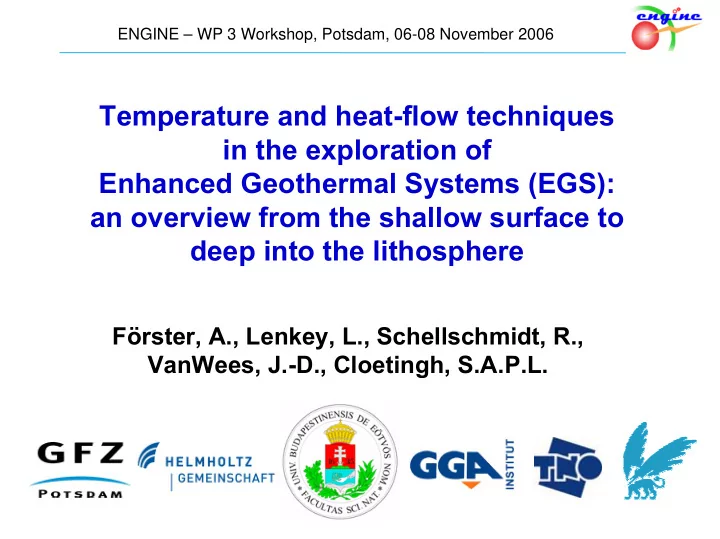

ENGINE – WP 3 Workshop, Potsdam, 06-08 November 2006 Temperature and heat-flow techniques in the exploration of Enhanced Geothermal Systems (EGS): an overview from the shallow surface to deep into the lithosphere Förster, A., Lenkey, L., Schellschmidt, R., VanWees, J.-D., Cloetingh, S.A.P.L.
ENGINE – WP 3 Workshop, Potsdam, 06-08 November 2006 • Evaluation of the thermal state of subsurface formations at drillable depth • Deciphering of processes responsible for temperatures appropriate for EGS development
ENGINE – WP 3 Workshop, Potsdam, 06-08 November 2006 Surface Heat Flow (Haenel and Hurter, 2002)
ENGINE – WP 3 Workshop, Potsdam, 06-08 November 2006 Basic Data - temperature values/profiles - temperature gradient - thermal conductivity (core/cuttings) - terrain effects incl. topography, paleoclimate etc.
ENGINE – WP 3 Workshop, Potsdam, 06-08 November 2006 Temperature � dT/dz = q / k sst Depth � salt q=60 q=80 shl heat flow q = k dT/dz BSMT
ENGINE – WP 3 Workshop, Potsdam, 06-08 November 2006 Surface heat flow is an important thermal parameter to characterize thermal potentials Strong resemblance between surface heat flow and subsurface temperature T at z = 2000 m T at z = 1000 m (Haenel and Hurter, 2002)
ENGINE – WP 3 Workshop, Potsdam, 06-08 November 2006 Geodynamic processes in lithosphere and asthenosphere Heat generation and thermal conductivity of crust Heat distribution by fluids
Babuska & Plomerova (2006) ENGINE – WP 3 Workshop, Potsdam, 06-08 November 2006 High amplitude / small wavelength anomalies, where and why ? (Cloetingh et al., 2005)
mantle crust ENGINE – WP 3 Workshop, Potsdam, 06-08 November 2006 stretched geotherm dT/dz McKenzie (1978) Transient heat flow 1/ β Normal geotherm dT/dz Lithospheric thickness
ENGINE – WP 3 Workshop, Potsdam, 06-08 November 2006
ENGINE – WP 3 Workshop, Potsdam, 06-08 November 2006 NGB Rhine Valley Pannonian B. Larderello Field
ENGINE – WP 3 Workshop, Potsdam, 06-08 November 2006 North German Basin • Heat flow by conduction • High heat flow (70-90 mW/m²) as a result of lithosphere thickness and crustal composition North German Basin (Norden and Förster, submitted)
ENGINE – WP 3 Workshop, Potsdam, 06-08 November 2006 Different temperature qualities BHTs (DSTs) T-Logs Different mapping scale/detail Heat refraction at salt structures
ENGINE – WP 3 Workshop, Potsdam, 06-08 November 2006 Tuscan Geothermal Fields • Mass and heat flux from the mantle in an extensional setting • Emplacement of granite magmas (3.8-1.3 Ma) Heat Flow Anomalies • Extensional shear zone as main pathways for flow of hot fluids towards superficial reservoir Heat Flow Shear Zone (Bellani et al., 2004)
ENGINE – WP 3 Workshop, Potsdam, 06-08 November 2006 The Rhine Graben Temperature at 800 m • Thermal anomalies are not correlated to crustal thickness • Heat transfer is as combination of conduction and convection (Pribnow and Schellschmidt, 2000)
ENGINE – WP 3 Workshop, Potsdam, 06-08 November 2006 conduction convection BHTs versus Temperature Logs convection convection conduction GPK2 borehole (Pribnow and Schellschmidt, 2000)
ENGINE – WP 3 Workshop, Potsdam, 06-08 November 2006 Temperature (°C) 0 50 100 150 200 0 Friedland 1/71 BASIC TEMPERATURE DATA: 500 Temperature log (steady-state conditions) 1000 1500 Temperature log plus multiple BHTs Temperature log 2000 Temperature log plus single BHT 2500 Multiple BHTs at different depths - no log Single BHT - no log Depth (m) 3000 3500 4000 CORRECTION 4500 Empirical Numerical 5000 5500 48h 6000 19900h VALID TEMPERATURE-DEPTH BHT DISTRIBUTION 6500 Equ. BHT (Förster, 2001) 7000
ENGINE – WP 3 Workshop, Potsdam, 06-08 November 2006 • Raw temperatures deviate by as much as 22 ± 10°C (1 δ ) from the true formation temperature • Corrected temperatures underestimate formation temperatures by as much as 8 – 9°C. • Large standard deviations indicate that corrected BHTs (with 2 δ confidence) reflect formation temperatures not better than ± 16°C.
ENGINE – WP 3 Workshop, Potsdam, 06-08 November 2006 BHTs vs. Temperature Log (Blackwell and Steele, 1988)
ENGINE – WP 3 Workshop, Potsdam, 06-08 November 2006 Internal thermal properties often unknown locally and regionally of sedimentary basins
ENGINE – WP 3 Workshop, Potsdam, 06-08 November 2006 More data are needed Thermal Conductivity Data banking is rudimentary yet Laboratory Measurements Well-Log Approaches PETROPHYSICAL WIRELINE LOGS: Gamma-ray (API units) Density 3 (g/cm ) Sonic (msec/ft) Neutron porosity (limestone-equiv. units) “PETROPHYSICAL DESCRIPTORS”: Vsh : proportional volume of shale RHOmaa : apparent matrix density Dtmaa : apparent matrix transit time PHIe: “effective” porosity
ENGINE – WP 3 Workshop, Potsdam, 06-08 November 2006 Estimated Accuracy of Heat-Flow Determination (based on methodology)
ENGINE – WP 3 Workshop, Potsdam, 06-08 November 2006 Signatures of Temperature Field EGS Concept Phase EGS Exploration Phase EGS Development Phase
Recommend
More recommend